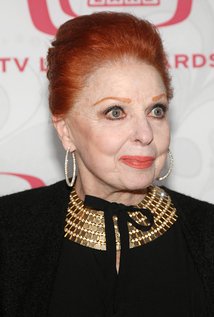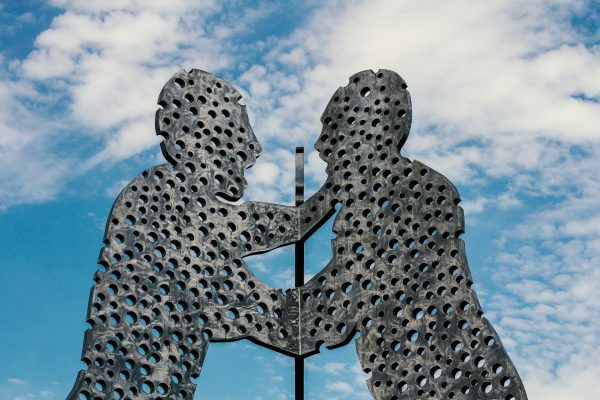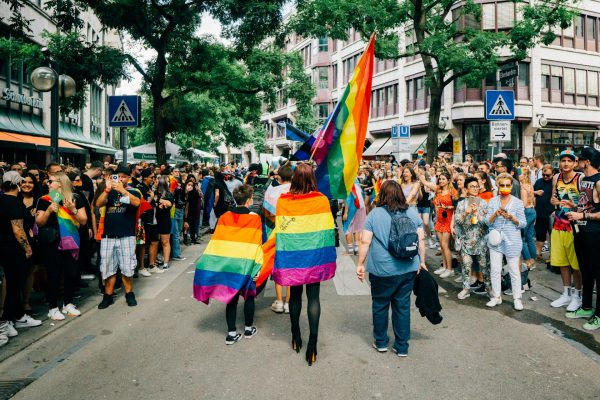Actress Carole Cook is a triple threat. She has starred on stage, screen, and television for years. Her credits include The Lucy Show, MacMillian and Wife, Grey’s Anatomy, Palm Springs Weekend, American Gigolo, Summer Lovers, Sixteen Candles, 42nd Street, Mame and Hello Dolly. These are only a few credits from her long career in show business. It would seem like Carole has been too busy performing to do anything else, but she says that one of her greatest accomplishments is the work she does as an activist for the LGBTQIA+ community. She has been raising money for people living with HIV/AIDS, for over 30 years. Carole is a straight, married woman. Carole and her husband Tom Troupe are a constant presence on the scene in Hollywood and on Broadway. They are passionate about raising awareness and money for people living with HIV/AIDS.
I recently spoke with Carole about her work within the LGBTQIA+ community.
WW: Do you mind if I call you an activist for LGBTQIA+ community?
CC: Not at all. I’ve been fighting LGBTQIA+ rights for over thirty years. My first introduction to AIDS was in 1983 or 1984. I was getting ready to open the Los Angeles company of 42nd Street. Now at that time, in New York, there was a lot of talk about AIDS. It wasn’t called AIDS or HIV then. It was called gay cancer and the gay epidemic. There was a kid in the chorus of 42nd Street, who got sick. He was a very young man, and he was from a wealthy family. His family disowned him. I was appalled and shocked by what happened to him and I began to look into this disease.
WW: This was in the early years of the crisis?
CC: It was before there were any organizations to help. Back then it was considered a death sentence. Our friends started dying. Tom and I got phone calls every week that, someone we loved was either sick or had died. It was a grim time.
WW: This is what got you involved?
CC: Tom and I got together with about 10 to 15 of our friends and started raising money. We gathered together what money we could and gave it to our friends, who’d gotten sick. They needed things like groceries, rent, and utilities. You see, the problem was so big and many of our friends had partners. So, if one of them got sick then before long the partner would get sick too and there was no help for them. What we did was–kind of a homegrown charity to help our friends.
WW: Did you lose a lot of friends in those early years of the disease?
CC: It was terrible. We lost fellow performers, choreographers, directors, producers, and musicians. The entertainment profession has always been a refuge for LGBT people and we lost a whole generation of people. It wasn’t just the people, who already worked in entertainment but a generation of young people, who got sick before they even had a chance to have careers.
WW: What was the reaction from the straight community back then?
CC: The “civilians”—that’s the word I use for them–were very smug. Tom and I were in trenches fighting a battle for our friends’ lives. The “civilians” didn’t care because it was a GAY disease. They were very insensitive to rising number of casualties.
WW: You mean, they were glad to be rid of us?
CC: Not everyone. There were others, who fought with us but a lot of people just felt that AIDS wasn’t their problem. They were stupid because HIV/AIDS is a disease and diseases spread. Eventually, women and children began getting sick and that’s when the “civilians” began to take notice. You know, President Reagan never said the word “AIDS.”
WW: Why do you think that was?
CC: People didn’t want to say the word. It was like saying the word made it real and as long as it was a gay disease then it wasn’t something for them to worry about.
WW: Rock Hudson made it real for a lot of people, didn’t he?
 CC: Oh yes. Rock was a good friend ours. I had worked with him on many episodes of Macmillan and Wife.
CC: Oh yes. Rock was a good friend ours. I had worked with him on many episodes of Macmillan and Wife.
At first, his being sick was a big secret. I had thought of Rock for playing the role of the director in the Los Angeles company of 42nd Street. It’s a key role and he could talk-sing it. I was planning on calling the producers in New York and suggest him for the part until I saw him one day at the car wash on Santa Monica Blvd. and I was taken aback.
WW: Why?
CC: Rock had always been such a masculine and good-looking man but his appearance had totally changed. He was thin, sallow with sunken cheeks, and he looked very weak. He said to me, “I guess you’re surprised that I’ve lost so much weight. Well, I have a heart problem.”
WW: What did you think when he said that?
CC: Well, I guessed that he had contracted AIDS but it was really for him to decide how to handle it. Nobody knew how to handle it back then. Actors and actresses had to stay in the closet or lose their careers. Eventually, Rock knew he was going to die and he went public about his condition, with the help of his publicist, Dale Olson. Rock helped make the disease real to people.
WW: His death must have hit you hard.
CC: Every death hit me and Tom hard. We got phone call after phone call and we went funeral after funeral. These were our friends, people we loved and they were dying. Like I said, it was a grim time. We visited our friends at home and in the hospital and we had to wear masks and gowns. It wasn’t because we were afraid—it was because they had no immune systems and we didn’t want to expose them to germs or bacteria that would end their life.
WW: And then you got involved with STAGE benefit?
CC: David Galligan called me. You see, director, David Galligan, Michael Kearns, James Carroll Pickett and Susan Obrow had an idea to help people with HIV/AIDS. It was their bid to do something about this disease.
WW: So that was the start of the STAGE benefit?
CC: Yes, the first show was the music, Leonard Bernstein. Mr. Bernstein was very upset about the crisis and allowed us to use all his music, free of charge and then other performers like myself committed to performing, free of charge. Everyone in the community got together. Musicians, actors, stagehands–just all of us. It was very much like Mickey Rooney and Judy Garland in a barn saying, “Let’s put on a show.”
WW: What was that first benefit like?
CC: We were so poor. I think we charged $10.00 a ticket. We had to explain ourselves since the disease was so new and still a mystery to people. For us, it was all too real but for a lot of people, it was just a story on the news that they didn’t give any attention.
WW: Where was the first benefit held?
CC: It was at the Variety Arts Theatre in Hollywood. We cleaned the toilets, took out the trash and helped each other with make-up and costumes for the show.
WW: Stage and movie stars were cleaning toilets?
CC: Honey, there wasn’t anybody else to do it. We were all performers, that’s what we know how to do and if we could get people to give money and pay for a ticket– with whatever NAME value we had–then by God we were going to do it. We wanted every cent to go to helping the people who needed it. The first benefit had no budget and we told people that the price of admission was groceries to give to the food bank, a $10 donation or whatever you could afford.
WW: So no one got paid? Everyone donates his or her time and talent?
CC: That’s right. My hairdresser was in the audience for the first show. His name was Russell Smith. He came to me after the show and he said, “You women on the stage are WBV’s”
WW: What’s a WBV?
CC: A Walking Beauty Violation. The next year, he got involved and got his friends involved, so we’d look good on the stage. He was a wonderful man. I miss him dearly. He died of the disease.
WW: The benefit has grown and is still going strong?
CC: This will be our 32nd year. What we do is different from the big ones like Elizabeth Taylor or Elton John. They raise millions for research. The money we raise goes directly to people living with HIV/AIDS. We help people on a one-to-one basis. The things they need to get through the day. Groceries, rent, bills—all the necessities.
WW: You work for other charities too?
CC: Every year I perform at a benefit in San Francisco called Help Is On The Way. It was started by two women whose only sons both died of AIDS. They started the organization as a way to honor their sons’ memories and help other sons and daughters living with HIV and AIDS.
WW: That organization does a lot of work for young people. What do you think about young people today and their attitude toward HIV/AIDS?
CC: Well, I don’t think they take it as seriously. I wish the younger generation weren’t so promiscuous. They seem to have the attitude that, they have no worries. They can just take a cocktail. I don’t like the word cocktail even though it’s a medical cocktail. I think the word cocktail lessens the severity of the situation. Today’s young people weren’t around to see their friends die, so they don’t know about the grim reality of the disease. People still contract HIV every day and people still die of AIDS. In the early days, HIV/AIDS was like a prairie wildfire that you couldn’t stamp out.
WW: And it’s still burning.
CC: Absolutely. I mean there have been great strides but it’s a double-edged sword.
WW: HIV is no longer a death sentence.
CC: No and that’s the most glorious, wonderful thing but the downside is that new diseases have come along. Other diseases are getting more attention and more money and the economy has been so bad that there is less money to spread around. People are still working their asses off to raise money for HIV/AIDS.
WW: You and your husband Tom still work hard?
CC: Honey, we can’t just sit on our butts and say everything is fine. It’s not. We have to do something. We lost so many people near and dear to us that it’s our responsibility to keep working until the disease wiped off the planet.
WW: David Galligan said, “Carole and Tom are the backbones of the STAGE benefit. They have such great spirit and energy. They constantly offer encouraging words and good cheer. They lift up everyone involved. They are buoyant.”
CC: Tom and I have been fortunate to have wonderful careers and we feel we must give back.

Carole Cook and husband Tom Troupe
WW: Tell me about your career. How did you get started?
CC: Well, I was born in Texas and I dreamed of being on Broadway. Early on I worked in summer stock. I was building a name for myself as an actress when I got a call from Lucille Ball. I was doing KISMET in Warren Ohio. Lucy was putting together a musical revue at the theatre on the DESILU lot. She brought me to Hollywood to be in the revue. After that, I screened tested and then Lucy put me under contract.
WW: That must have been a life changer.
CC: Yes it was. I had no place to live in California so I lived in Lucy’s guesthouse until I got settled. She changed my name. I was born Mildred Frances Cook but Lucy didn’t think it was a good show business name. She gave me the name Carole after Carole Lombard. Lucy said to me, “You have the same healthy disrespect for everything in general, just like Lombard.” Lucy gave me my big break.

Lucille Ball as Mame
WW: When was that?
CC: In 1961.
WW: So that would make you how old?
CC: Honey, I’m no good at math.
WW: What are some of your favorite roles?
CC: I can’t really say. It’d be like a mother saying she prefers one child to another. However, I did love playing Dolly Levi. She’s such a strong character and doesn’t follow the rules. I did Hello Dolly in Australia for two years. I had blast doing Grease. I mean I got to ride a donkey and be a smart-ass—perfect for me. I loved the role that I played on Grey’s Anatomy because it meant something. My husband Tom and I have done the play, The Lion in Winter at many theatres and it’s great, fun role and I love doing it with Tom, who I think is one of the best living actors. His one man show, “Diary of Madman” is truly amazing. For the movies, I had a ball on Sixteen Candles and working with Richard Gere in American Gigolo…well, it was Richard Gere. I love him.
WW: One last question, what do think of all the attention being given to transgender people in entertainment?
CC: Darling, it’s great. I mean the business is so hard that if you get some attention then GO FOR IT. YOU BETCHA! I don’t see any reason why they shouldn’t go for it. It’s not harmful to anyone. They do no harm. There is no harm in being who you truly are. I mean, we all have our peculiarities. God knows, I do.
WW: What do you say to all the LGBTQIA+ haters out there?
CC: The rednecks and those who hate LGBTQIA+ people are harmful. They are bigots. They are hateful people, who will do America in. They will destroy this country if we let them. We can’t let them.
Carole will be performing on March 5th at the McCallum Theatre in Palm Desert to help celebrate Carol Channing’s 95th birthday.
Carole performs her cabaret show at many venues around the country. Carole will also be performing at the STAGE benefit in Los Angeles on June 18 and at the Help is On The Way benefit in San Francisco (date to be announced ).
To find out more or make a donation to the STAGE benefit and the organization Help Is On The Way visit the following websites:
www.stagela.com and www.reaf-sf.org






